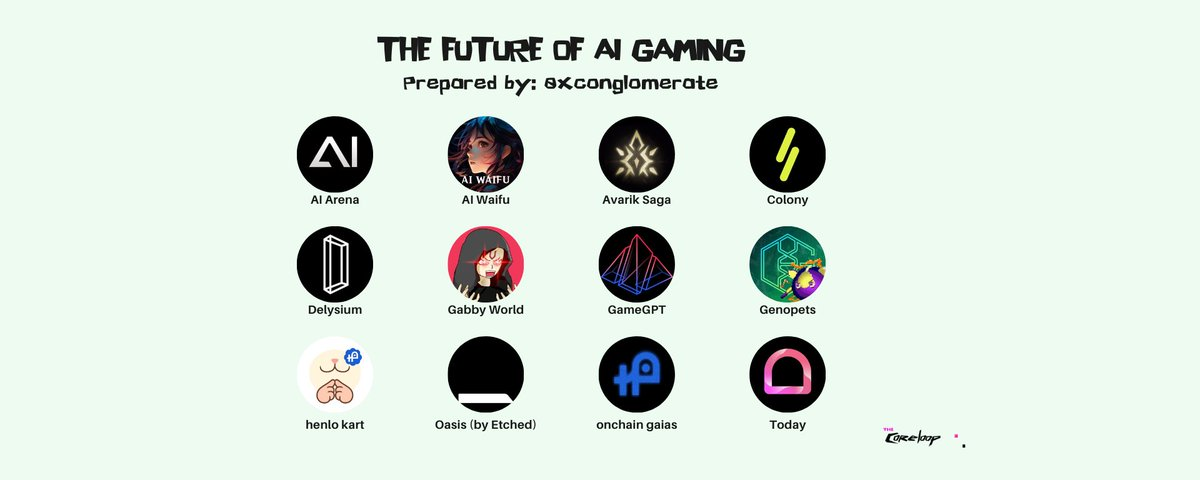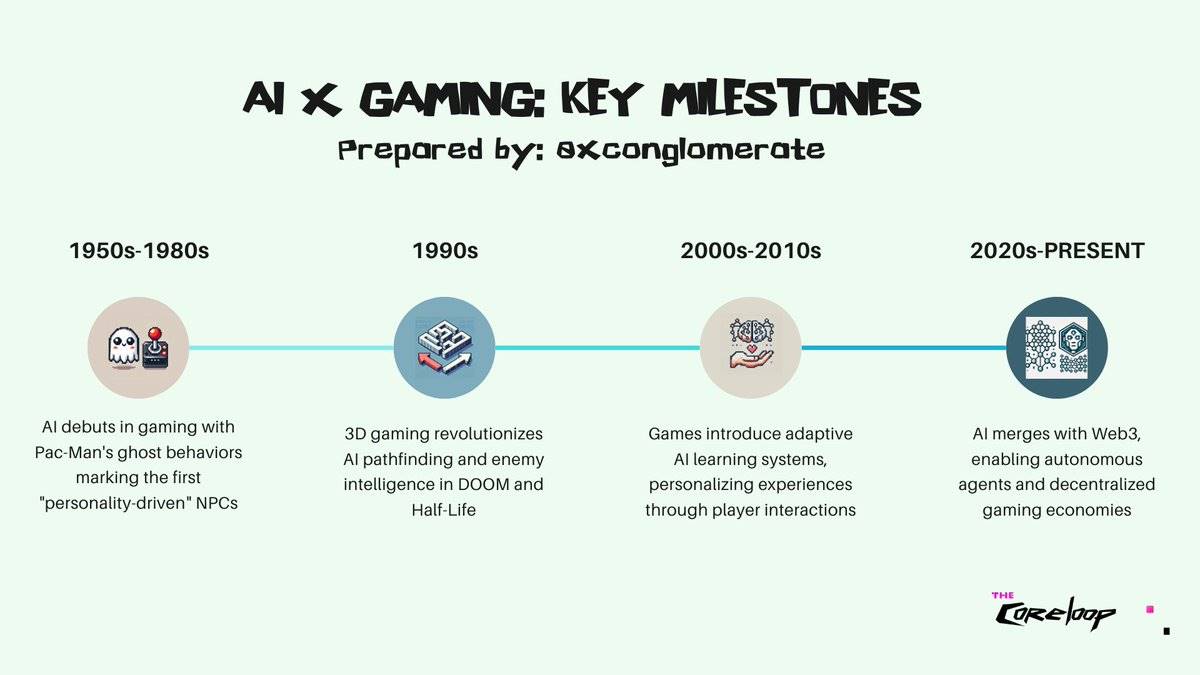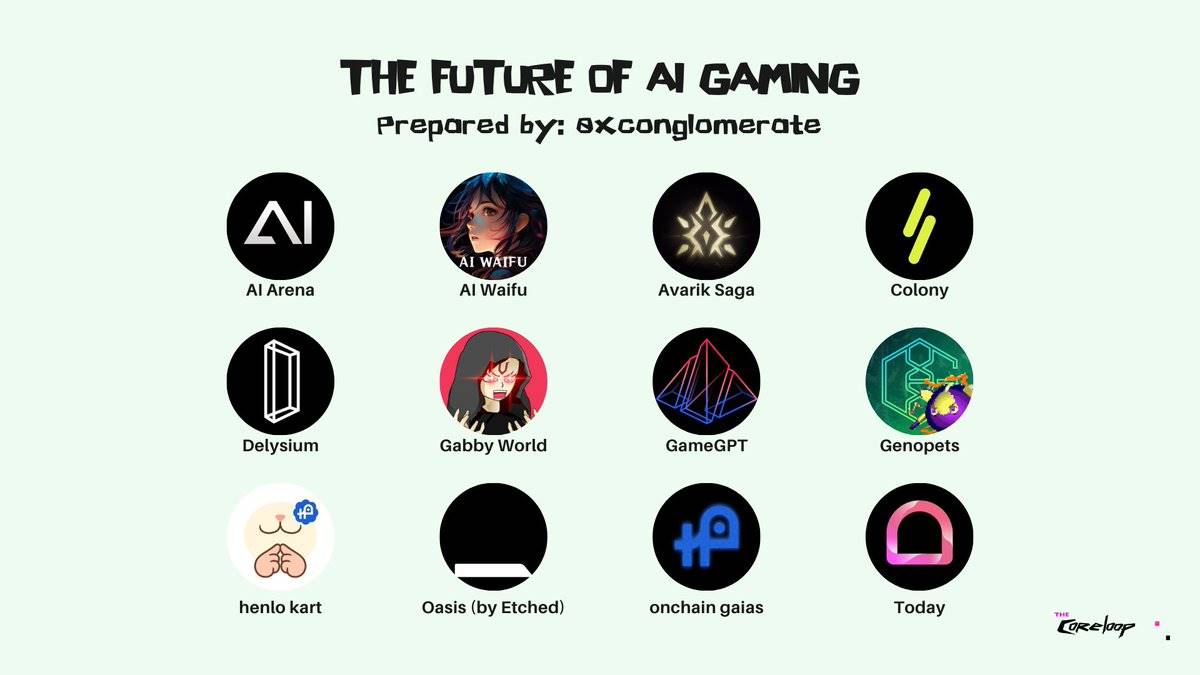Author:Conglomerate | thecoreloop
Compiled by: TechFlow

AI is currently a hot topic in the crypto space, but its integration with Web3 games is still in its early stages. After hours of research, I have identified areas that could generate real value. Here are my key findings:
Topic Overview
A Brief History of AI and Games
How Current Web2 Game Companies Leverage AI
The Next Chapter of AI Games: From Web2 to Web3
AI and Web3 Game Projects
Key Trends in AI and Web3 Games
A Brief History of AI and Games
Games have always been an ideal testbed for artificial intelligence. Their unique responsiveness, constantly changing objectives, and real-time environments make them an ideal environment for advancing AI technology. Early AI development faced significant hurdles, requiring predefined rules or simplified environments to operate. However, these limitations spawned creative solutions, and games became the perfect stage for progress.
2015 was a pivotal moment: an AI agent mastered 49 Atari games, matching professional human performance, solely through pixels and scores. This breakthrough proved that AI could learn naturally in complex environments, laying the foundation for today's AI revolution.

From Arcade AI to Autonomous Agents: Games have evolved from simple computer opponents to player-owned, self-learning characters in the Web3 era.
How Current Web2 Game Companies Leverage AI
Building on these foundations, leading game companies are implementing AI technology in innovative ways.
Roblox (announced in February 2023): Revolutionizing user-generated content (UGC) in games through the integration of generative AI, helping 58.8 million daily active users create 3D models and code with simple prompts.
Sony AI (announced in November 2019): Focusing on fundamental AI research to enhance Sony's gaming business.
King (active since 2017): Pioneering the use of AI in game development, particularly through game testing bots, which have reduced manual level adjustments in Candy Crush Saga by 95% and increased development speed by 50%.
The Next Chapter of AI Games: From Web2 to Web3
AI has already demonstrated its transformative value in games, reshaping how games are built, played, and experienced. While Web2 giants continue to innovate, the crypto gaming space remains largely untapped, presenting enticing opportunities for AI-driven advancements.
In the following sections, we'll explore some pioneering projects that are combining AI and Web3, redefining the future of gaming.
AI and Web3 Game Projects
Allows players to train AI-driven Non-Fungible Token (NFT) warriors through imitation learning and analyze and improve character performance using the AI Inspector tool, preparing for automated PvP battles.
AI Waifu // @aiwaifugg // $WAI
A fantasy character platform with AI-supported personalized dialogues, comic generation, and voice interactions, featuring hundreds of community-created characters and scenes.
Avarik Saga // @avariksaga // $AVRK
A mobile RPG game where AI-driven demigods interact with players both in-game and through large language model-driven dialogues on popular messaging apps.
Colony // @ParallelColony // $PRIME
An AI-driven strategic survival simulation game where AI agents, called "Avatars," continuously learn from their surrounding environment.
Delysium // @The_Delysium // $AGI
Initially a battle royale MMORPG with AI-driven virtual creatures, and now building Lucy, an AI-driven Web3 operating system on the YKILY network.
Gabby World // @gabby_world_ // $GABBY
The first fully autonomous AI world, where all elements - from characters to storylines - are generated on-chain through user-created prompts.
Read: Re-Introducing Gabby World: The First AIGC Autonomous World
GameGPT // @Gamegptofficial // $DUEL
Provides an AI-driven game builder that empowers creators to engage in rapid, collaborative game development, democratizing the creative process and unlocking immersive experiences at an unprecedented pace.
A "move-to-earn" game where every step provides energy to the AI-driven digital pet, converting physical activity into game progress and valuable AI training data.
henlo kart // @henlokart // n/a
A hamster racing mini-game launched by the Onchain General Intelligence (OGI) network, a decentralized platform supporting the creation, training, and deployment of open, decentralized AI agents.
Oasis // @Etched // n/a
The first fully AI-generated game world, where players can explore, build, and destroy endless varieties of procedural environments, driven by advanced AI rendering technology.
onchain gaias // @onchaingaias // n/a
Generalized Artificial Intelligence Agents (GAIAs) bring decentralized, player-trained AI agents into games, allowing users to shape, train, and benefit from agents in a community-driven ecosystem.
Today// @todaythegame // n/a

A social simulation game where AI-driven island residents create unique personalized interactions and drive a player-owned virtual economy.
Note: This overview is based on current research and represents a selection of AI and Web3 gaming projects, not a comprehensive list. The information provided is for educational purposes only and should not be considered financial advice.
Conclusion
AI and Web3 are fundamentally reshaping the gaming landscape, bringing personalized experiences to players and empowering them to actively shape virtual worlds. We are moving beyond basic AI functionality into fully autonomous environments where every player's decision has an impact, transforming players from passive consumers to empowered participants.
Projects like AI Waifu and Today are not just entertainment platforms; they are evolving into social ecosystems where AI-driven characters create profound personal connections and drive player-owned economies. The integration of AI training through gameplay, as seen in Genopets and AI Arena, further emphasizes this shift towards player-centric value creation.
Perhaps most importantly, the convergence of AI and Web3 technologies is making game development more accessible than ever before. Projects like GameGPT and Oasis demonstrate how AI tools can break down traditional creative barriers, allowing anyone to participate in building these new virtual worlds. This transformation, coupled with the rise of autonomous AI agents and player-owned data, suggests we are witnessing the early stages of a gaming revolution where the boundaries between players, creators, and AI blur, forming a single, dynamic ecosystem.








